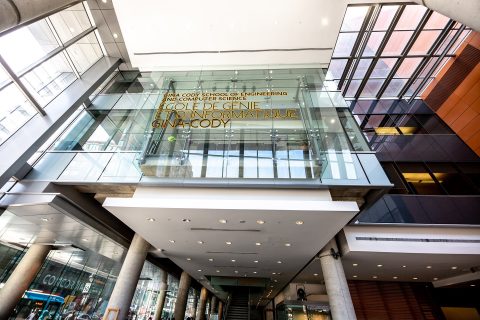Building Engineering (MEng)
Program overview
The MEng in Building Engineering allows practicing engineers to build on knowledge obtained at the undergraduate level. The program enhances design skills and your ability to present technical material in written form. Some examples of subfields studied include building science, construction management, energy efficiency and rehabilitation of urban infrastructures. The program requires the satisfactory completion of 45 credits of course work. All graduate courses are scheduled in the evening, particularly convenient for practicing engineers who are employed full-time.
Program structure
Degree Requirements
The requirements described here are in addition to the general degree requirements for the Master/Magisteriate in Engineering (MEng) in the General Requirements for all Engineering and Computer Science Programs.
Fully-qualified candidates are required to complete a minimum of 45 credits.
Please see the Engineering Courses page for course descriptions.
Building Engineering MEng (45 credits)
| 5 | credits of Core Courses: |
| 28 | credits minimum chosen from the groups listed below to facilitate the selection of courses in a particular area of interest: Building Science (Building Engineering MEng) Building Environment (Building Engineering MEng) Energy Conversion (Building Engineering MEng) Integrative Studies for Building Engineering (Building Engineering MEng) Note: A maximum of 2 courses (8 credits) can be taken from the Integrative Studies for Building Engineering (Building Engineering MEng) list to be counted towards the 28 credits. Additional courses from this list would count towards the 12-credit group below. |
| 12 | credits maximum chosen from the Engineering Courses section. Four credits maximum (i.e.: one 4-credit course or four 1-credit courses) can be selected from Topic Area E09 - Professional Leadership Skills |
The 28 credits minimum are to be selected from the following courses.
Building Science (Building Engineering MEng)
| |
Building Environment (Building Engineering MEng)
Energy Conversion (Building Engineering MEng)
| |
Integrative Studies for Building Engineering (Building Engineering MEng)
Admission requirements
Proficiency in English
Proficiency in English. Applicants whose primary language is not English must demonstrate that their knowledge of English is sufficient to pursue graduate studies in their chosen field. Please refer to the English language proficiency page for further information on requirements and exemptions.
Application process
Application deadlines

FALL
July 1 (Canadian resident)
March 1 (International)

WINTER
November 1 (Canadian resident)
July 1 (International)

SUMMER
March 1 (Canadian resident)
November 1 (International)
Priority will be given to complete applications submitted by the deadline. In some cases, programs may continue to accept applications as long as there is space available.
International students: Considering the waiting period involved in meeting the entry requirements to Canada and Quebec, we strongly encourage international applicants to apply early and submit supporting documents prior to the deadline.
Tuition & funding
Tuition and fees
Tuition and fees of the program may depend on your student status, among other key factors. Estimate these costs based on the most common situations.
Awards and funding
Funding packages are generally available for students in thesis-based programs. Course-based students may be eligible for a number of donor awards, and may consult with their department for program-specific opportunities.
Out-of-province students
Get $3,000 in special funding for non-thesis master's programs. Learn more
Other programs of interest

Strengthen and extend your knowledge as a practising civil engineer, to further develop your analytical skills, and to enhance your ability to comprehend advanced technology concepts and solve complex problems.
Department
Department of Building, Civil and Environmental Engineering
Faculty

Strengthen your undergraduate engineering degree by diving into graduate research in building engineering subfields including building science, construction management, energy efficiency and rehabilitation of urban infrastructure.
Department
Department of Building, Civil and Environmental Engineering
Faculty

Enhance your professional skills by specializing in one or more sub-disciplines including building science, building envelope, construction management, energy efficiency and building environment.
Department
Department of Building, Civil and Environmental Engineering
Faculty


